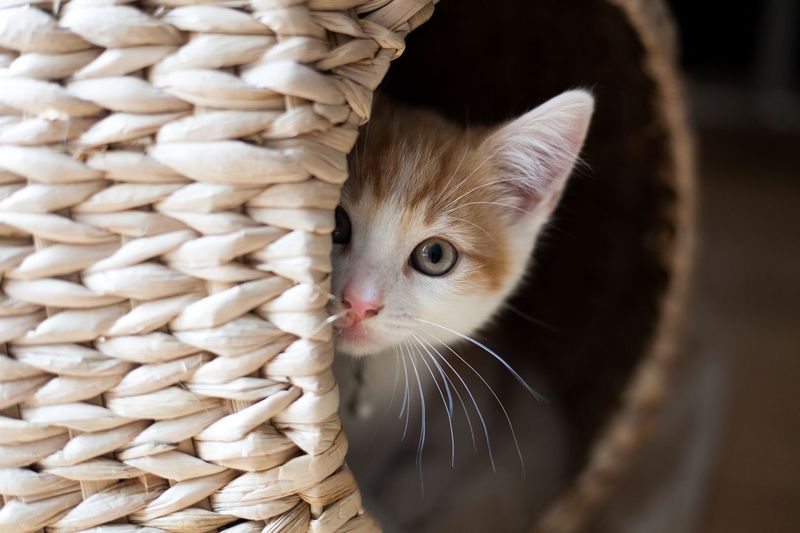📖 Table of Content:
- 1. Avoid Yelling or Loud Noises
- 2. Don’t Ignore Their Need for Attention
- 3. Handle Them Gently
- 4. Respect Their Space
- 5. Avoid Sudden Changes
- 6. Introduce Other Pets Slowly
- 7. Don’t Punish – Redirect Instead
- 8. Keep Their Litter Box Clean
- 9. Give Them Safe Places to Hide
- 10. Use Positive Reinforcement
- 11. Spend Quality Time Together
Bringing home a new kitten is one of life’s sweetest joys. Their tiny paws, curious eyes, and playful antics quickly steal our hearts—but beneath that adorable exterior is a fragile, emotionally sensitive being. Just like people, kittens feel fear, confusion, and even sadness when they’re misunderstood or mishandled.
Many new pet parents unintentionally hurt their kitten’s feelings through actions that seem harmless on the surface. What might feel like discipline or routine to us can feel overwhelming or scary to a kitten still learning how to navigate their new world. The good news is that with a little awareness and a lot of love, it’s easy to create a nurturing environment where your kitten feels safe, respected, and loved.
This guide outlines 11 practical ways to avoid emotional harm and build a strong, lasting bond with your kitten. Each section dives into everyday behaviors that could be emotionally distressing and offers kind, thoughtful alternatives.
1. Avoid Yelling or Loud Noises
Kittens have incredibly sensitive hearing, and sudden loud noises can trigger a fight-or-flight response. Raising your voice—even in frustration—can cause them to become scared of you, leading to long-term trust issues. Instead of yelling, try using a firm but calm tone to redirect unwanted behavior. Your goal isn’t to scare them—it’s to guide them gently. Background noise like loud music or slamming doors should also be minimized, especially during their first few weeks at home. Providing a quiet, calm space helps them adjust more easily to their surroundings. Remember, a peaceful environment leads to a more confident and secure kitten.
2. Don’t Ignore Their Need for Attention
Though kittens can be independent, they still rely heavily on social interaction, especially during their developmental phase. Failing to spend enough quality time with them can lead to loneliness and even behavioral issues. Be intentional about engaging with your kitten every day through petting, play, or simply sitting nearby. They learn to bond through shared moments and will come to associate you with comfort and affection. Loneliness can feel very intense for a young kitten who has just been separated from their littermates or mother. Ignoring their attempts to connect—like meowing or pawing at you—can make them feel rejected. Prioritize bonding early, and you’ll build trust that lasts for life.
3. Handle Them Gently
Physical handling plays a big role in how a kitten perceives safety and affection. Picking them up abruptly, gripping too tightly, or forcing contact can create fear and resistance. Always approach your kitten slowly and let them sniff or observe you first before touching. Use two hands when lifting them—one supporting their chest and the other under their back legs. If they squirm, gently let them go instead of holding tighter. Over time, with consistent gentleness, they’ll learn to associate touch with love rather than fear. Respecting their comfort zone builds emotional safety.
4. Respect Their Space
Not every moment is the right time to cuddle or play, and that’s okay. Kittens, like humans, need alone time to rest, process, or self-soothe. Trying to force interaction when they retreat or hide can increase their anxiety. Allow them to emerge on their own terms and show that you’re a safe presence by staying calm and patient. Respecting their body language—like flattened ears or a twitching tail—goes a long way in showing you care. A kitten that feels in control of its environment will naturally grow more curious and confident over time. Creating a stress-free environment means letting them come to you when they’re ready.
5. Avoid Sudden Changes
Cats thrive on consistency, and kittens especially depend on predictable surroundings to feel secure. Moving furniture frequently, shifting feeding times, or introducing new people without warning can overwhelm them. To make transitions easier, introduce new stimuli slowly and let your kitten acclimate at their own pace. Try to stick to regular routines—same feeding time, same sleeping spot, same play hour. If you must change something, like switching rooms or changing litter brands, do so gradually over several days. Predictability reduces stress and helps your kitten understand what to expect. Emotional well-being begins with a sense of stability.
6. Introduce Other Pets Slowly
Meeting other animals is a big deal for a tiny kitten just learning the ropes. A rushed introduction can cause panic or territorial stress, especially if the other pet is assertive. Begin by letting your kitten and the other pet smell each other through a closed door or a baby gate. Use short, supervised meetings and watch their body language closely. Hissing, hiding, or fluffing up may mean they need more time before another try. Keep initial interactions positive and reward calm behavior with treats or affection. Over time, slow introductions help your kitten build confidence and feel safe in a multi-pet home.
7. Don’t Punish – Redirect Instead
Punishment doesn’t work the same way for cats as it does for dogs—and it can backfire badly with kittens. Scolding, spraying with water, or physical punishment will only damage your bond and cause fear. Instead of punishing, redirect your kitten to a more appropriate behavior. For example, if they scratch the couch, show them a scratching post and reward them for using it. Encourage what you want to see rather than scaring them out of what you don’t. Positive reinforcement teaches better and strengthens trust. A confident kitten learns best through patience and praise.
8. Keep Their Litter Box Clean
A clean litter box isn’t just about hygiene—it’s about emotional comfort too. A dirty or smelly box can cause distress, leading your kitten to avoid it or have accidents around the house. Scoop daily and change litter frequently, especially while they’re still learning. Make sure the box is placed in a quiet, private area so they don’t feel exposed. Try to avoid scented litter, which can be overwhelming to their sensitive noses. A calm, clean space gives them a sense of control and safety. A tidy litter box shows you’re meeting both their physical and emotional needs.
9. Give Them Safe Places to Hide
Security means having a retreat when the world feels too big. Whether it’s a cozy blanket fort, a cardboard box, or a cat tree nook, kittens love hiding spots. These places allow them to self-soothe when they’re overstimulated, scared, or tired. Never force them out of hiding—instead, make the space welcoming and safe so they return on their own. Offering vertical spaces like shelves or window perches also gives them a sense of control. Let your kitten choose their “safe zones” and respect their use of them. The freedom to retreat is a huge part of emotional well-being.
10. Use Positive Reinforcement
Encouragement works wonders with kittens, who are naturally curious but need guidance. Instead of focusing on “what not to do,” catch your kitten doing something right—and praise them for it. Offer treats, toys, or kind words when they use their scratching post, litter box, or play gently. Repeating this kind of positive feedback helps them understand expectations in a way that feels safe and rewarding. Never underestimate the power of a gentle “good kitty” and a few chin scratches. Over time, they associate you with safety and warmth. Trust grows from repeated kindness.
11. Spend Quality Time Together
Love isn’t just about food and shelter—it’s about presence. Your kitten needs time with you to feel secure and bonded. Playtime helps burn energy, but it also teaches them that you’re a source of joy. Gentle petting or relaxing together builds emotional closeness and reduces stress. Try to spend small, consistent blocks of time together each day. Even just sitting nearby while they nap or explore shows you care. A kitten who feels emotionally connected to their person grows up to be a confident, affectionate cat.











